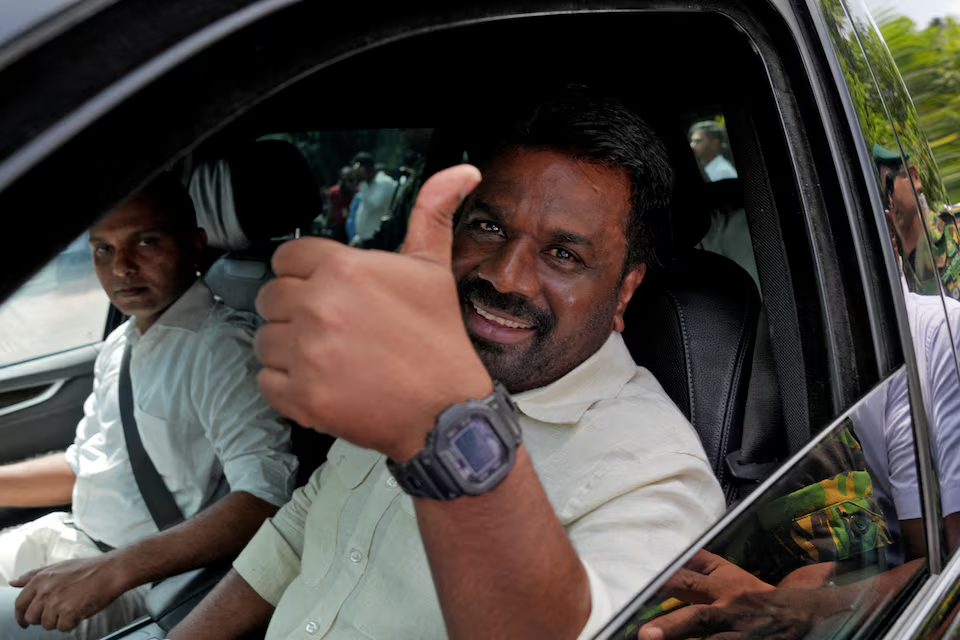Sri Lankan President Anura Kumara Dissanayake’s leftist coalition won a thumping victory in a snap general election, gaining power to push through his plans to fight poverty and graft in the island nation recovering from a financial meltdown.
The sweeping mandate, which included surprise backing from the north and east of the country which is home to the minority Tamil people, is an unprecedented vote for change and indicates that Sri Lanka is in sync on moving ahead, analysts said.
While the strong showing will strengthen political stability in the South Asian country, some uncertainty on policy direction remains due to Dissanayake’s promises to try and tweak terms of the International Monetary Fund (IMF) rescue programme that bailed the country out of its economic crisis, they said.
The new government is also expected to face a talent challenge as the coalition has few leaders with governance and policy-making experience.
Dissanayake, a political outsider in a country dominated by family parties for decades, comfortably won the island’s [USN:L1N3L309M TEXT:“presidential election”] in September.
But his coalition had just three seats in parliament, prompting him to dissolve it and seek a fresh mandate in Thursday’s snap election.
Sri Lanka typically backs the president’s party in general elections, especially if voting is held soon after a presidential vote.
“The president has a huge mandate now to carry through the reforms but also huge expectations from the people,” said Bhavani Fonseka, a researcher at Colombo think tank Centre for Policy Alternatives.
“People are looking beyond the issues of the past … people want to see a direct impact on the cost of living,” she said.
STRONG MAJORITY, BIG CHALLENGES
Dissanayake’s Marxist-leaning National People’s Power (NPP) coalition won 159 seats in the 225-member parliament, the election commission said on Friday, a massive two-thirds majority and one of the biggest in the country’s history.
NPP secured almost 62% or almost 7 million votes, up from the 42% Dissanayake won in September, indicating that he had drawn more widespread support including from minorities.
The Sri Lanka Podujana Peramuna party of the Rajapaksa family, whose cohort of brothers gave Sri Lanka two presidents during a dozen years in power and had 145 seats in the outgoing legislature, was virtually wiped out, winning just three seats.
“We see this as a critical turning point for Sri Lanka. We expect a mandate to form a strong parliament, and we are confident the people will give us this mandate,” Dissanayake said after casting his vote on Thursday.
Item 1 of 5 Sri Lanka’s President and National People’s Power (NPP) party leader Anura Kumara Dissanayake gestures as he leaves after casting his vote on the day of the parliamentary election in Colombo, Sri Lanka, November 14, 2024.
Sri Lanka’s President and National People’s Power (NPP) party leader Anura Kumara Dissanayake gestures as he leaves after casting his vote on the day of the parliamentary election in Colombo, Sri Lanka, November 14, 2024.
“There is a change in Sri Lanka’s political culture that started in September, which must continue.”
TENTATIVE ECONOMIC RECOVERY
Celebrations were largely muted, with the exception of a few NPP loyalists who lit fireworks on the outskirts of the capital, Colombo.
The Samagi Jana Balawegaya party of opposition leader Sajith Premadasa, the main challenger to Dissanayake’s coalition, won 40 seats and the New Democratic Front, backed by previous President Ranil Wickremesinghe, won just five seats.
The president wields executive power but Dissanayake still required a parliamentary majority to appoint a fully-fledged cabinet and deliver on key promises to cut taxes, support local businesses, and fight poverty.
The two-thirds majority also gives Dissanayake the power to begin the process of abolishing the executive presidency, although analysts say that is not a pressing concern and is unlikely to be a priority.
While he was in opposition, Dissanayake argued against the massive powers of the executive presidency and its links to abuse of power.
A nation of 22 million, Sri Lanka was crushed by a 2022 economic crisis triggered by a severe shortage of foreign currency that pushed it into a sovereign default and caused its economy to shrink by 7.3% in 2022 and 2.3% last year.
Boosted by a $2.9 billion bailout programme from the International Monetary Fund (IMF), the economy has begun a tentative recovery, but the high cost of living is still a critical issue for many, especially the poor.
Dissanayake also aims to tweak targets set by the IMF to rein in income tax and free up funds to invest in welfare for the millions hit hardest by the crisis.
But investors worry his desire to revisit the terms of the IMF bailout could delay future disbursements, making it harder for Sri Lanka to hit a key primary surplus target of 2.3% of gross domestic product (GDP) in 2025 as set by the IMF.
On Friday, Sri Lanka’s international bonds nudged slightly higher with the 2026 maturity rising 0.3 cents to 62 cents in the dollar, Tradeweb data showed.
Many of the bonds are trading at their strongest level since late 2021, before the country tumbled into default a few months later.
“The country has given a clear mandate politically. The key question would be if this is at the cost of economic policy,” said Raynal Wickremeratne, co-head of research at Softlogic Stockbrokers in Colombo.
“I think with this majority they may try to negotiate a bit more on the (IMF) targets as well,” he said. “A continuation of the current reform programme on a broader extent would be positive for the country.”
